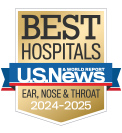Newborn Hearing Screening
Our Audiology team provides early identification of potential hearing loss in order to provide early intervention for services and treatment. All infants who refer on their inpatient hearing screening will be screened for a subsequent screening here at the clinic. Infants identified with possible hearing loss will be referred for additional testing. Parents of all newborns and infants diagnosed with a hearing loss will be provided written information on the availability of community resources and services for children with hearing loss.
Diagnostic Evaluations may include one or more of the following to establish a battery of tests:
Behavioral Testing
VRA – (Ages 6 months to ~ 2 years) A test in which a child is trained to respond to a sound source by looking to a visual source after a stimulus is presented through headphones or soundfield. The child is rewarded with visual reinforcement such as a light or TV clip.
CPA – (Ages ~ 2 years to 5 years) A test in which a toddler participates in a game where he/she listens for sounds presented through headphones. The child indicates a response to sounds by a conditioned response such as throwing a toy in a bucket or pressing of a button. This is made into a game and often used on children ages 2 and older dependent upon consistent cooperation of the child, ability and temperament.
Auditory Brainstem Response
ABR stands for “auditory brainstem response”. ABR testing is a simple and reliable way to test hearing of infants and small children who cannot cooperate with the usual hearing test. The ABR is a diagnostic test to measure the softest level that the hearing nerve responds to sounds using different pitches or tones. ABR testing is done with a computer. Electrodes are placed on the forehead and behind the ears. Clicking sounds are presented through earphones/inserts to the child’s ears. The ABR equipment measures the electricity that moves up the hearing nerve from the ear to the brain.
ABR testing can only be performed on sleeping children. The muscle movements of an awake and lively child interfere with the test results. Therefore, make sure your child is sleepy for the test. Do not let him/her nap before the test. Wake them earlier than normal. Delay feeding time so you can feed right before the ABR test. Please bring your child’s blanket, pacifier or bottle to help him/her sleep. Arrange childcare for additional children in the family. The ABR test usually takes 1 to 2 hours. However, testing cannot begin until the child falls asleep. You should plan spending most of a morning or afternoon in the clinic. Bring extra food and diapers in case.
The audiologist will share your test results with you at the completion of testing.


